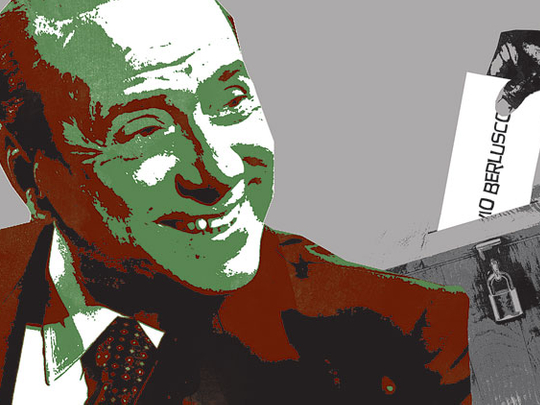
Can Silvio Berlusconi do it? A few weeks ago the prospect that Italy’s former prime minister would stage a comeback was laughable. Now, with less than two weeks to go before polling day, it may be the media magnate and playboy former premier who has the last laugh. The last opinion polls published before an official blackout period point to a closer race than many expected: the gap between Pier Luigi Bersani’s left-of-centre coalition and Mr Berlusconi’s right-of-centre alliance has narrowed to 5-6 percentage points.
In most western countries, such a lead in the last stretch of a campaign would be considered safe. Not in Italy. To start with, there are lingering doubts that the polls are a proper reflection of public opinion. For many people, voting for Mr Berlusconi is a guilty secret not to be shared with a pesky pollster. There are ways to correct for this bias but there is no way to know if they really work.
The real uncertainty, however, is Mr Berlusconi himself. The man is still by far the best campaigner around. He is not a statesman – he is a showman. The media is his natural habitat (and the source of much of his wealth). In spite of everything – the scandals, judicial indictments, poor performance in office – 8m voters are still willing to vote for him and his illusory promises of tax paybacks and job creation. Combined with his allies’ supporters, they could be enough for a victory. Were this to happen, all the credibility Mario Monti’s technocratic government has painfully won for Italy in the past 14 months would disappear instantly. As Europe slowly sorts out its financial crisis, this would be a very serious setback.
But the magic and tricks of the consummate performer are unlikely to work as they used to. Many are comparing this campaign to that of 2006, when Romano Prodi wasted a lead of 6 percentage points and ended up winning in the lower house with a margin of 0.1 per cent. Today the picture is different. Then it was a two-way race. Now there are four competitors: running alongside the two main ones are Mr Monti and Beppe Grillo, an anti-establishment comedian.
It is true that Mr Berlusconi has been able to win back some of his lost supporters since his return to the scene after he was forced to resign in November 2011 in the midst of a dramatic financial crisis. But the easy gains are over; in a crowded field the extra, decisive votes are more elusive.
For this reason it is likely – though by no means certain – that Mr Bersani and his allies will win one vote more than anybody else in the lower house, which is all it takes to win a majority of the seats.
The senate is a different story. Here the majoritarian bonus is assigned region by region, creating a sort of US-style electoral college, where each region has a certain weight. To gain a solid majority, it is necessary to win the bonus in most of these regions and particularly in the big ones. Lombardy, in the north, is crucial. It is a combination of Ohio and California. Like Ohio, it is up for grabs by either coalition but it carries a weighting similar to that of California. If Mr Bersani loses here, it is highly unlikely he can win an absolute majority. This scenario will open the door for Mr Monti’s participation in the next government. The paradox is that this will happen only if Mr Berlusconi wins Lombardy, since Mr Monti himself cannot.
A Bersani-Monti cabinet is the most likely outcome. Yet one cannot entirely discard the most disturbing possibility of all. Mr Berlusconi’s chance of increasing his share of the vote are limited – but Mr Bersani’s chances of decreasing his are not. If polls do not lie, the present leads should be safe. But, as I have said, polls may lie to some extent. What matters more now, however, is that in recent weeks the trend for Mr Bersani has been downwards.
A lacklustre campaign, Mr Berlusconi’s bravado and the derivatives scandal surrounding Monte dei Paschi di Siena, the Tuscan bank, have all contributed to this trend. Mr Grillo has been the main beneficiary. His Five Star Movement will be the surprise success of this election but it will not change the outcome. If the slide of Mr Bersani’s coalition continues, what was unimaginable just a few weeks ago could become possible: a victory by default for Mr Berlusconi in the lower house.
Even so, Mr Berlusconi will not win in the senate. Electoral arithmetic makes this a fact, not a guess. The outcome then would be a house-senate split. The government needs a confidence vote in both. Where would Mr Berlusconi find the extra seats he would need?
For Italy – and Europe – the answer to that question is no laughing matter. The reappearance of Mr Berlusconi is bad enough. The prospect of Italy plunging once more into chronic instability is worse.
FT
Roberto D’Alimonte is professor of political science at LUISS-Guido Carli









